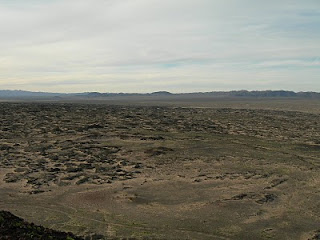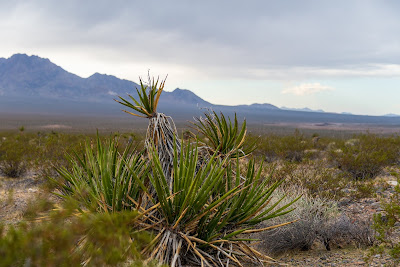Rep. Jerry Lewis Set to Oppose CDPA 2010?
Congressional Representative Jerry Lewis (41st District) has expressed concern that Senator Feinstein's proposed California Desert Protection Act 2010 (CDPA 2010) locks up too much desert land from potential energy development, mining, and military training, according to the Hi-Desert Star website. Rep. Lewis' early opposition deserves some historical context.
The early California Desert Protection Act of 1994 (which created the Mojave National Preserve and upgraded Joshua Tree and Death Valley to National Park status) lacked compromise with some stakeholders-- recreational users, hunters, and ranchers. Rep. Lewis took advantage of this and a hostile atmosphere toward environmental conservation among the newly empowered GOP-controlled congress to opposed the 1994 bill. In the end, compromises were made and the 1994 CDPA passed, although Rep. Lewis budgeted only $1.00 to run the newly created Mojave National Preserve (MNP) in its infant years.
Rep. Lewis is signaling his intent to oppose CDPA 2010, suggesting he does not realize that CDPA already has compromises built into the legislation. Lewis is much more concerned with tag line politics and short term economic benefit than ensuring his district's--and his country's--heritage is preserved. His concern for economic and military development simply do not pan out, and his office has done little to ensure proper land stewardship in the Mojave Desert. Rep. Lewis' allocation of a single dollar to the budget of the MNP reflected the respect he has for the natural beauty of his district.
Senator Feinstein's CDPA 2010 would encourage energy developers to look to the nearly 350,000 acres designated as solar energy study areas by the Federal Government, curbing the modern gold rush threatening to fragment the Mojave. If anything, a successful bill would funnel development onto land where it would cause less harm to the Mojave, and thus save developers from a lengthy and contested EIS battle (which is far more likely under the prevailing free-for-all scenario). The legislation would also help renewable energy developers overcome environmental mitigation requirements in the siting applications.
As for military training, the bill would leave the door open for the Marine Corps base at Twentynine Palms to conduct maneuvers outside the current boundary, and the additional wilderness areas would not prohibit Ft. Irwin's current expansion plans.
Sadly, Rep. Lewis' opposition portends a battle that will only harm all of the stakeholders in the Mojave. By expressing his opposition to CDPA 2010 legislation even though he admittedly had not fully studied the legislation, Rep. Lewis is seeking to increase the volume of the extremes on each side -- environmentalists arguing for more wilderness protection or restrictions on land use, and businesses, unions, and off-road vehicle users arguing for the opposite. Rather than position himself as a sounding board for extreme voices in an attempt to scuttle meaningful land stewardship, Rep. Lewis should act responsibly and seek to represent the full array of interests that seek to enjoy the Mojave.
Just as we have seen with the solar energy siting debate, the Mojave's inspiration is boundless, but it's fragility and borders ultimately will require sound land management. Without a compromise that responsibly guides wilderness preservation, off-road recreational use, military training, and economic development, the Mojave Desert would soon be stripped of its beauty and the American heritage that it embodies.
The early California Desert Protection Act of 1994 (which created the Mojave National Preserve and upgraded Joshua Tree and Death Valley to National Park status) lacked compromise with some stakeholders-- recreational users, hunters, and ranchers. Rep. Lewis took advantage of this and a hostile atmosphere toward environmental conservation among the newly empowered GOP-controlled congress to opposed the 1994 bill. In the end, compromises were made and the 1994 CDPA passed, although Rep. Lewis budgeted only $1.00 to run the newly created Mojave National Preserve (MNP) in its infant years.
Rep. Lewis is signaling his intent to oppose CDPA 2010, suggesting he does not realize that CDPA already has compromises built into the legislation. Lewis is much more concerned with tag line politics and short term economic benefit than ensuring his district's--and his country's--heritage is preserved. His concern for economic and military development simply do not pan out, and his office has done little to ensure proper land stewardship in the Mojave Desert. Rep. Lewis' allocation of a single dollar to the budget of the MNP reflected the respect he has for the natural beauty of his district.
Senator Feinstein's CDPA 2010 would encourage energy developers to look to the nearly 350,000 acres designated as solar energy study areas by the Federal Government, curbing the modern gold rush threatening to fragment the Mojave. If anything, a successful bill would funnel development onto land where it would cause less harm to the Mojave, and thus save developers from a lengthy and contested EIS battle (which is far more likely under the prevailing free-for-all scenario). The legislation would also help renewable energy developers overcome environmental mitigation requirements in the siting applications.
As for military training, the bill would leave the door open for the Marine Corps base at Twentynine Palms to conduct maneuvers outside the current boundary, and the additional wilderness areas would not prohibit Ft. Irwin's current expansion plans.
Sadly, Rep. Lewis' opposition portends a battle that will only harm all of the stakeholders in the Mojave. By expressing his opposition to CDPA 2010 legislation even though he admittedly had not fully studied the legislation, Rep. Lewis is seeking to increase the volume of the extremes on each side -- environmentalists arguing for more wilderness protection or restrictions on land use, and businesses, unions, and off-road vehicle users arguing for the opposite. Rather than position himself as a sounding board for extreme voices in an attempt to scuttle meaningful land stewardship, Rep. Lewis should act responsibly and seek to represent the full array of interests that seek to enjoy the Mojave.
Just as we have seen with the solar energy siting debate, the Mojave's inspiration is boundless, but it's fragility and borders ultimately will require sound land management. Without a compromise that responsibly guides wilderness preservation, off-road recreational use, military training, and economic development, the Mojave Desert would soon be stripped of its beauty and the American heritage that it embodies.




Jerry Lewis is wrong again. Vote him out of office.
ReplyDelete